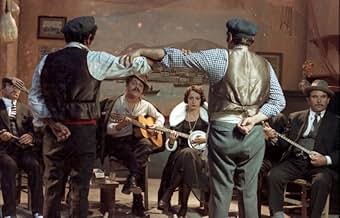NOTE IMDb
8,1/10
3,2 k
MA NOTE
Ajouter une intrigue dans votre langueThe story of a group of Rembetes, singers and musicians of the Greek equivalent to the blues, in the early decades of the 20th century, seen through the eyes of a young female singer.The story of a group of Rembetes, singers and musicians of the Greek equivalent to the blues, in the early decades of the 20th century, seen through the eyes of a young female singer.The story of a group of Rembetes, singers and musicians of the Greek equivalent to the blues, in the early decades of the 20th century, seen through the eyes of a young female singer.
- Réalisation
- Scénario
- Casting principal
- Récompenses
- 6 victoires et 2 nominations au total
Avis à la une
In Greece, Rembetiko had always been known as the music of the outcasts. Even the dance that is normally associated with it, (Zeimbetiko), occasionally looks like some kind of ritualistic act of defiance, to those ancient Greek deities, who for their own amusement, are constantly interfering with all our lives, creating Tragedy, Comedy, Pathos and Irony. It had traditionally been associated with Greek refugees from the west coast of Anatolia, who for various reasons, had become dispossessed and were now confined to living their lives under the lower step of the Greek urban social order, engaged in a life style that was considered borderline at best, in more ways then one. The time depicted in this film, covers a period in Athens from about 1922 -1958. This was a time of tremendous transition and instability for the entire Greek nation. The film begins with a montage of what the Greeks have called the Asia Minor Disaster, which was basically a military campaign (waged with rival nation Turkey) gone wrong, and which resulted in a population exchange with their nemesis nation, that increased the population in Greece by approximately 25% almost overnight, in 1923. Most of them ending up in Athens. In was in these overcrowded and economically and spiritually destitute conditions during the 1930's, that the Rembetiko genre of music reached its height in popularity. After that, came a World War and Nazi occupation in 1940, and then a tragic Civil War in 1948.
On to even more economic and political instability thru-out the 1950's. In "Rembetiko the movie" veteran Director Costas Ferris, much akin to a masterpainter, uses these historical events, by either showing or suggesting them, to recreate a background of a social order, that always seems to be on the edge of chaos and collapse. Scenery, costumes, period piece trivia etc. are all well executed and are quite successful in recreating a realistic and believable visual context for the period. The viewer will have little difficulty in the area movie pundits love to call "the suspension of disbelief". Winner of the prestigious Silver Bear award in 1984, and without question, one of the most absorbing and provocative films ever to come out of the Hellenic Republic, this is a story that works on many levels, from the superficially romantic and absurd to the exceedingly tragic and disturbingly profound. This is especially true if one is familiar with the history and urban culture of contemporary Greece, during the early and middle years of this century. This 107 minute Hellenic "Once Upon a Time" for adults, is both controversial and unforgettable. The basic storyline may seem somewhat simplistic, but that simplicity is deceptive. There is a great deal going on here that is not always plainly evident. Some of the events portrayed, are based upon the actual life experience of one Marika Ninou, who in reality, had in fact been a well known Rebetisis from that period. A Rebetisis today, is simply a term used for a female singer of Greek Rebetiko music. However during the period in question, being called a Rebetisis had a connotation, that was somewhat more pejorative in nature. The film follows the life experiences of the primary character, also named Marika, from the day of her unwanted birth and exceedingly difficult childhood, to her rise and eventual decline, as a popular Rebetisis, while still only in her mid thirties. She is essentially a very complex character, who is driven by a blind ambition to succeed in her singing career, while simultaneously being sustained through every ordeal in her life, by nothing more, then an enormous strength of character along with an equally strong determination and will to survive. However, in her quest to the top, she becomes increasingly self-centered, detached and alienated, as both personal relationships and the overwhelming external events surrounding and affecting her life, spin quickly out of control. Nevertheless finding a deep rooted empathy for her came easy and naturally. In the beginning of the film, Marika is a young women in search of artistic recognition for her music. By the end of the film, ( in a final scene, that can only best be described as quintessentially Greek ), she is, in a very curious and symbolic way, redeemed by it ! Sortiria Leonardou gives a Tour de Force performance as Marika, while the glorious and haunting original Rembetiko compositions of Stavros Xarhakos, permeate the entire production. This is a very powerful film !!
On to even more economic and political instability thru-out the 1950's. In "Rembetiko the movie" veteran Director Costas Ferris, much akin to a masterpainter, uses these historical events, by either showing or suggesting them, to recreate a background of a social order, that always seems to be on the edge of chaos and collapse. Scenery, costumes, period piece trivia etc. are all well executed and are quite successful in recreating a realistic and believable visual context for the period. The viewer will have little difficulty in the area movie pundits love to call "the suspension of disbelief". Winner of the prestigious Silver Bear award in 1984, and without question, one of the most absorbing and provocative films ever to come out of the Hellenic Republic, this is a story that works on many levels, from the superficially romantic and absurd to the exceedingly tragic and disturbingly profound. This is especially true if one is familiar with the history and urban culture of contemporary Greece, during the early and middle years of this century. This 107 minute Hellenic "Once Upon a Time" for adults, is both controversial and unforgettable. The basic storyline may seem somewhat simplistic, but that simplicity is deceptive. There is a great deal going on here that is not always plainly evident. Some of the events portrayed, are based upon the actual life experience of one Marika Ninou, who in reality, had in fact been a well known Rebetisis from that period. A Rebetisis today, is simply a term used for a female singer of Greek Rebetiko music. However during the period in question, being called a Rebetisis had a connotation, that was somewhat more pejorative in nature. The film follows the life experiences of the primary character, also named Marika, from the day of her unwanted birth and exceedingly difficult childhood, to her rise and eventual decline, as a popular Rebetisis, while still only in her mid thirties. She is essentially a very complex character, who is driven by a blind ambition to succeed in her singing career, while simultaneously being sustained through every ordeal in her life, by nothing more, then an enormous strength of character along with an equally strong determination and will to survive. However, in her quest to the top, she becomes increasingly self-centered, detached and alienated, as both personal relationships and the overwhelming external events surrounding and affecting her life, spin quickly out of control. Nevertheless finding a deep rooted empathy for her came easy and naturally. In the beginning of the film, Marika is a young women in search of artistic recognition for her music. By the end of the film, ( in a final scene, that can only best be described as quintessentially Greek ), she is, in a very curious and symbolic way, redeemed by it ! Sortiria Leonardou gives a Tour de Force performance as Marika, while the glorious and haunting original Rembetiko compositions of Stavros Xarhakos, permeate the entire production. This is a very powerful film !!
Beautiful film and the music was very moving. This is a great film for people who want to delve deeper in to Greek culture. The many actresses that played Marika were very well chosen. Hats off to Ferris who wrote such a story. The scenery in the film really helped give an idea about the slums. I wish the subtitles were a bit better because I noticed there was more going on and not enough being translated. It is amazing how the blues genre of the world is the same in soul but different in sound. I would have loved a bit more history on Asia minor. The music at the lemon market is my favourite in the beginning. This story is not about the famous Greek singer although a lot of similarities do exist but amazing movie nonetheless.
The history underpinning this Film is the one that makes this film really unique. It is very hard for this film to be translated and make it understandable by the majority of people that can't speak Greek and may not feel the story. The story begins around 1920 in the coastal area of (now days)Turkey. Between the war most of the Greeks owned this area, however most of them were killed (not as soldiers but as unarmed people)and all the others were sent to Greece were they had to start their life from zero. The passion and the lyrics of the music as well is what makes this film one of the best in Greece. Rempetiko is this kind of music that was carried in main Greece by them.
10boerpoel
I was very pleased to find 'Rembetiko' on DVD after so many years! Back then, it only was on for a short time at my local cinema/art-house (Rotterdam, Holland)/ right after, I was *very* impressed and checked for another view, but it was the very last one performance, alas. Since then, this movie became some sort of a myth in my memory.
After seeing the film after almost 25 years it feels very different... (now I'm older I know more in what way Greece also suffered during WWII/ and their drama is still not very well known in Europe, they kept the horror more quiet, IMO). So this knowledge was an extra for me in 2007.
Therefore I disagree with the former poster "dionysianartist", the emphasis on the Nazi-period gives the movie a wonderful twist. Perhaps this way, it also returns the feeling to the true blues of 1920's Rembetica.
My DVD came with these subtitles; *Greek *English *French *Spanish *Italian *German *Turkish (No further extra's).
Check it out; great film, with much of the Greek sphere and feelings involved.
John.
After seeing the film after almost 25 years it feels very different... (now I'm older I know more in what way Greece also suffered during WWII/ and their drama is still not very well known in Europe, they kept the horror more quiet, IMO). So this knowledge was an extra for me in 2007.
Therefore I disagree with the former poster "dionysianartist", the emphasis on the Nazi-period gives the movie a wonderful twist. Perhaps this way, it also returns the feeling to the true blues of 1920's Rembetica.
My DVD came with these subtitles; *Greek *English *French *Spanish *Italian *German *Turkish (No further extra's).
Check it out; great film, with much of the Greek sphere and feelings involved.
John.
Rembetiko music was the music of the people living their lives on the slums of that time. People using drugs, women who sold their bodies to survive, small time crooks, angels and demons of the ghettos of that era.
The soundtrack of this film, was written exclusively for this project by Xarhakos. One the greatest Greek composers ever. And it is a masterpiece. It has catchy songs, it has songs with political messages, it has hymns to sadness, it is a versatile masterpiece. And in many scenes, Ferris, the director of the movie, managed to lock the musical track playing in the background, with the scenes in front with absolute perfection.
The movie manages to show us how these people lived back then. And their struggles and emotions. But I honestly think i love this film mainly because I am Greek and A, I know the history of my people, and B, I love Rembetiko music. I am not sure it will be a nice cinematic experience for foreigners who ignore historic facts about modern Greece and who have no idea about what Rembetiko music is.
I know for a fact that a lot of Turkish, Arab and Israeli people, who love rembetiko and similar music, loved this film. But even them, they loved it mainly because of the superb music. I state again that the music created for this film, is a collection of masterpieces. The uplifting tracks make you wanna stand up and dance, and the sad ones make you melancholic.
But I cannot say that the film is a great film overall. Chances are that if you dislike Greek rembetiko music, you will also find the film to be irrelevant. Greece being a tiny country, it's modern history is not known to non Greek people. So all films that show bits of that history, are doomed to look less interesting, or confusing to non Greek audiences.
A scene or even just a dialogue might make my heart turn to pieces because I know about the pain of the Greek people of that era.
But an Englishman will probably stand confused. So i would say that Rembetiko as film would be a nice experience for Greeks and for foreigners who love Rembetiko music. But the rest of you will probably find it without any meaning or purpose.
The soundtrack of this film, was written exclusively for this project by Xarhakos. One the greatest Greek composers ever. And it is a masterpiece. It has catchy songs, it has songs with political messages, it has hymns to sadness, it is a versatile masterpiece. And in many scenes, Ferris, the director of the movie, managed to lock the musical track playing in the background, with the scenes in front with absolute perfection.
The movie manages to show us how these people lived back then. And their struggles and emotions. But I honestly think i love this film mainly because I am Greek and A, I know the history of my people, and B, I love Rembetiko music. I am not sure it will be a nice cinematic experience for foreigners who ignore historic facts about modern Greece and who have no idea about what Rembetiko music is.
I know for a fact that a lot of Turkish, Arab and Israeli people, who love rembetiko and similar music, loved this film. But even them, they loved it mainly because of the superb music. I state again that the music created for this film, is a collection of masterpieces. The uplifting tracks make you wanna stand up and dance, and the sad ones make you melancholic.
But I cannot say that the film is a great film overall. Chances are that if you dislike Greek rembetiko music, you will also find the film to be irrelevant. Greece being a tiny country, it's modern history is not known to non Greek people. So all films that show bits of that history, are doomed to look less interesting, or confusing to non Greek audiences.
A scene or even just a dialogue might make my heart turn to pieces because I know about the pain of the Greek people of that era.
But an Englishman will probably stand confused. So i would say that Rembetiko as film would be a nice experience for Greeks and for foreigners who love Rembetiko music. But the rest of you will probably find it without any meaning or purpose.
Le saviez-vous
- AnecdotesThe movie sold 98,492 tickets. It came in 9th out of 33 movies.
- GaffesIn the 2004 director's cut version, at about 52:13, you can see a boom mic in the frame for about seven seconds. Maria is in the back room undressing, while Babis is talking to her from the front room. The mic peeks out from behind the left wall and is visible in the doorway between the two rooms in the center of the screen.
- Versions alternativesA version released in a retrospective presentation of Greek films organized by the New York Museum of Modern Art, has reduced running time (from 150 min. to 110 min.).
- ConnexionsEdited into To didymo tis symforas (1989)
Meilleurs choix
Connectez-vous pour évaluer et suivre la liste de favoris afin de recevoir des recommandations personnalisées
- How long is Rembetiko?Alimenté par Alexa
Détails
Contribuer à cette page
Suggérer une modification ou ajouter du contenu manquant
































